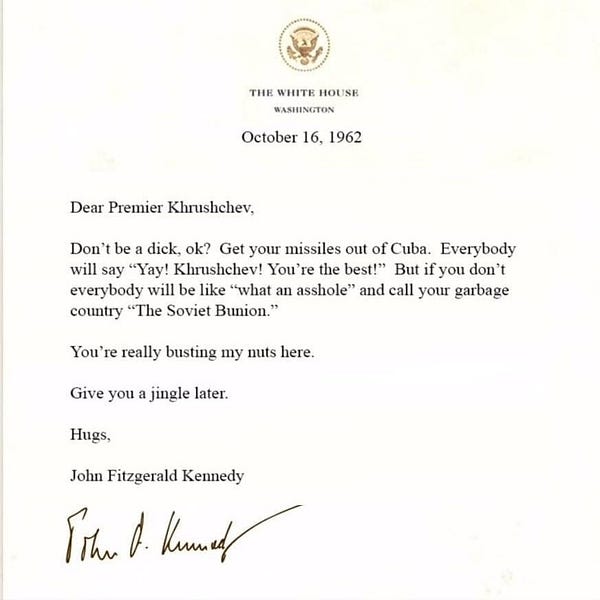Good morning, and happy Monday. The resident Bears fan on staff is starting to think Mitch Trubisky might not be the answer. (The resident Packers fan points out that the Bears drafted Trubisky before Patrick Mahomes and Deshaun Watson.)
Is There a Quid Pro Quo to Get Over?
Acting chief of staff Mick Mulvaney acknowledged in a press conference last Thursday that aid to Ukraine was withheld, in part, due to Trump’s interest in “corruption related to the DNC server.” When ABC’s Jonathan Karl asked him directly if what he was describing was the quid pro quo the White House had long denied, Mulvaney said it was. This kind of thing happens “all the time with foreign policy,” Mulvaney argued. “I have news for everybody: Get over it. There’s going to be political influence in foreign policy.”
But the shift from “no quid pro quo” to “hell yeah, quid pro quo” didn’t last long. Almost immediately, Trump’s external legal team and officials from the Department of Justice distanced themselves from Mulvaney admission. Trump truckler Sean Hannity lashed out at Mulvaney on his radio show. “What is Mulvaney even talking about? I just think he’s dumb, I really do,” Hannity said. “I don’t even think he knows what he’s talking about.”
Mulvaney isn’t dumb. He is without question one of the smartest people working in the White House. The bigger problem for Hannity’s argument: Mulvaney spoke with great authority on these issues because he wasn’t merely relaying hearsay or characterizing what others claimed; as he made clear, he was describing his own involvement in withholding the aid and characterizing his own conversations with the president and other top officials.
Nonetheless, Mulvaney tried to “clarify” his admission by claiming he hadn’t said what we’d all heard, blaming the “media” for misconstruing his comments. “Let me be clear, there was absolutely no quid pro quo between Ukrainian military aid and any investigation into the 2016 election,” he said in a mop-up statement later in the day on Thursday. He tried to defend his new position with Chris Wallace on Fox News Sunday. You can watch the whole interview here, but the exchange below gives you a sense of how it went:
WALLACE: Here's my first question. Why did you say that in that briefing that President Trump had ordered a quid pro quo, that investigating the Democrats, that aid to Ukraine depended on investigating the Democrats? Why did you say that?
MULVANEY: Again, that's not what I said. That's what people said I said.
Top officials close to the president (and reportedly the president himself) clearly wish Mulvaney had not admitted what he did on Thursday, and have fought to keep “no quid pro quo” as the official line.
But the day after Mulvaney’s presser and subsequent walkback, the Trump campaign launched a line of “Get Over It” T-shirts appearing to embrace and highlight Mulvaney’s initial argument rather than the line we saw on Sunday. A press release from the campaign said the “Get Over It” slogan “represents a call for Washington politicians to put aside political theater and false accusations and get back to work for the people of the United States.” When asked for comment on the potential discrepancy, the campaign told The Dispatch:
There was no quid pro quo and President Trump has done nothing wrong. Democrats have been fixated on impeaching the President since before he took office. They should get over it and get back to work for the people of the United States.
So while the “Get Over It” T-shirt may have been inspired by Mulvaney’s comments, the campaign contends its use of the slogan does not confirm the chief of staff’s original intent.
Poor Mulvaney
If that wasn’t enough, Mulvaney also had to answer to Chris Wallace on Fox News Sunday about another scandal of the president’s creation, and the original reason for Thursday’s press conference: the selection of Trump’s own Doral resort as the location for next year’s G-7 Summit, a move that was followed by a hasty reversal from the president on Saturday night.
Pressed by Wallace on why the Trump caved to pressure—which had mounted not just from Democrats and the media, as Trump claimed, but Republicans as well—Mulvaney said the White House was “surprised at the level of pushback” the decision generated, but also that “it's the right decision to change.” If it truly is the right decision to change venues, it follows that it was the wrong decision to try and host the summit there in the first place.
In a more candid moment, Mulvaney also acknowledged his week could have been a lot better had Trump not tried to sneak such an obvious ethics violation by the American people: “It's not lost on me that if we made the decision on Thursday, we wouldn't have had the press conference on Thursday regarding -- regarding everything else.”
‘I Wouldn’t Rule Anything Out’
When Michigan congressman Justin Amash abruptly left the Republican Party earlier this year, many observers wondered whether he was harboring higher aspirations than the House of Representatives.
Amash’s message Sunday to those observers: Keep wondering!
Asked by Chuck Todd if he would commit to defending his House seat, or whether he might seek a seat in the Senate or—gasp!—the Libertarian presidential nomination, Amash demurred. “No, I wouldn’t say 100% of anything. I’m running for Congress, but I keep things open and I wouldn’t rule anything out.”
The prospect of a long-shot Amash candidacy is interesting for a couple of reasons. He could provide a place for non-Trumpy conservatives and small-government independents to park their votes in a race that featured, say, Trump and a far-left Democrat like Elizabeth Warren. More consequentially, perhaps, would be his potential impact in his home state of Michigan, a state that is crucial to Trump’s electoral prospects. Trump has already drawn a motley trio of GOP primary challengers: former Reps. Mark Sanford and Joe Walsh and former Massachusetts Gov. Bill Weld. Their conservative bona fides vary: Walsh was formerly a bomb-throwing back-bencher in Congress, Sanford is a fiscal hawk with roots in the Tea Party, and Weld is a genteel New England liberal Republican.
But not even Sanford stacks up to Amash when it comes to his advocacy for limited government. Amash was elected to the House in 2010 as a Tea Party Republican, and continued to buck the party regularly on legislation that expanded the size and scope of the federal government—particularly with respect to the national debt and government surveillance—long after many of his Freedom Caucus peers fell in line. More recently, he’s enjoyed a strange new respect on the left, given his unabashed willingness to criticize the president: This spring, he became the first (then-)Republican to say Trump’s actions met the threshold for impeachment following the release of Robert Mueller’s report.
Amash hasn’t completed the transformation by simply recasting himself as a centrist: He’s the same wonky libertarian he’s been all along. This alone makes him an interesting guy to watch.
The Week Ahead: Syria
Facing open GOP revolt over his decision to allow Turkey to invade Kurdish lands in northern Syria, President Trump called an audible last week, sending Vice President Mike Pence on a last-second trip to Ankara to try to broker a peace agreement with Turkish President Recep Tayyip Erdogan.
It didn’t go well. Pence entered negotiations with a radically weaker hand than the U.S. had held mere weeks before: Turkey, after all, had already made the most of Trump’s unexpected green light, seizing miles and miles of Syrian land, displacing tens of thousands of Kurds as they advanced. Despite Trump’s dire threats to destroy the Turkish economy, Pence agreed to lift U.S. sanctions against Turkey and to require the remaining Kurdish forces to withdraw from the territory seized from them. In short, Turkey got everything it wanted, making only a single “concession”: a five-day cease-fire that would allow the remaining Kurds to withdraw from their own land without further bloodshed.
But President Trump isn’t one to be deterred by bad news. And so he spent the weekend behaving as though Pence had secured a perfect victory: He bragged repeatedly about the deal on Twitter, saying that it had saved “thousands and thousands of lives” (and, bizarrely, that America had “secured the oil”). Over the weekend, in keeping with Trump’s “mission accomplished” rhetoric, U.S. personnel began withdrawing from Syria. (Not to come home, however—troops previously stationed in Syria are now being deployed to Iraq.) The message couldn’t be clearer: It is the position of the United States that the Turkish incursion into Syria, though arguably regrettable, has been brought to a satisfyingly peaceful conclusion.
There’s only one problem: The already-shaky cease-fire ends Tuesday evening, and it’s far from clear the Kurds will have retreated to Erdogan’s satisfaction by that time. The Turkish leader has made his intentions very clear if the Kurds don’t: “We will start where we left off and continue to crush the terrorists’ heads,” he said during a television address Saturday.
If things go that way—and there’s no reason yet to believe they won’t—Trump will find himself more stranded on Syria than he was before. The Pence visit was a Hail Mary pass. What do you do after declaring it a major victory if things end up as bad as they ever were—or worse?
Adding to the Syria Protests: Petraeus
Domestic critics of the Syria withdrawal are growing louder and more numerous. The latest prominent voice to decry the move: retired Gen. David Petraeus, who told CNN Sunday that America had abandoned the Kurds without benefiting strategically.
“This does not end an endless war,” Petraeus said. “It probably prolongs it because this gives ISIS an opportunity for a resurgence.”
What Else We’re Reading/Watching
McKay Coppins has had the ear of Mitt Romney dating back to his days as a candidate for president. Coppins checks in with Romney in a new piece for The Atlantic and finds a senator “unconstrained by consultants, unconcerned about reelection,” and “thinking about things such as legacy, and inheritance, and the grand sweep of history.” Romney is looking to lay the foundation for a Republican Party post-Trump, but will he vote next month to expedite that reality?
The other losing presidential nominee of this decade also made some news over the weekend, as Hillary Clinton decided to go on a podcast and accuse current Democratic candidate Tulsi Gabbard, without evidence, of being “groomed” by Russia. Read Tom Nichols on why this was a mistake.
Presented Without Comment
(Okay, presented with one tiny comment: Maybe Kamala Harris should be focused on deleting a different 2016 presidential nominee’s Twitter account.)
(Okay, one more comment: Even if you can’t be POTUS, you can still be a poster.)
Pop Culture Recommendation
Parasite, the latest film from South Korean director Bong Joon-ho, might just be the movie of the year. The picture tracks two families—the down-on-their-luck Kims and the new-money Parks—as their fates become increasingly intertwined and identifying the protagonist becomes increasingly complicated. If you don’t take our word for it, it won the Palme d’Or at the Cannes Film Festival and has a 99 percent rating on Rotten Tomatoes. To avoid spoilers, we advise against reading any more about the movie than this. Just go see it.
Something Fun
In the aforementioned McKay Coppins piece, Romney admits to having a secret Twitter account he uses to follow along the political conversation. Less than 12 hours later, Slate’s Ashley Feinberg published a piece saying that she’d found it. Three hours after that, Romney confirmed that the account, registered under the name Pierre Delecto, was his.
The account is now private, so be sure to read Feinberg’s full piece for a glimpse into what the senator was up to on the interwebs, including liking a few tweets from our very own David French.
Toeing The Company Line
Another G-File was birthed into the universe on Friday afternoon, and if you haven’t read it yet, be sure to add it to the queue. Jonah takes a look at the relationship between power and money—and how both corrupt—while providing an explanation of the difference between monarchy and democracy to government officials who really shouldn’t need one.
Let Us Know
Which celebrity burner Twitter account made for the best story?
Reporting by Declan Garvey, Andrew Egger, and Steve Hayes.
Answer to Friday’s Let Us Know:
Which defense of Trump using the presidency to boost business at his private company is the most patriotic?
“Show me where there’s a violation of law. I’m not sure that there is, not that I’m aware of.” Mike Rounds
“It may seem careless politically, but on the other hand there’s tremendous integrity in his boldness and his transparency.” Kevin Cramer
“Anything that draws a major event like that to Florida is not something I would discourage.” Marco Rubio
“This was by far and away the best choice.” Mick Mulvaney







Please note that we at The Dispatch hold ourselves, our work, and our commenters to a higher standard than other places on the internet. We welcome comments that foster genuine debate or discussion—including comments critical of us or our work—but responses that include ad hominem attacks on fellow Dispatch members or are intended to stoke fear and anger may be moderated.
With your membership, you only have the ability to comment on The Morning Dispatch articles. Consider upgrading to join the conversation everywhere.